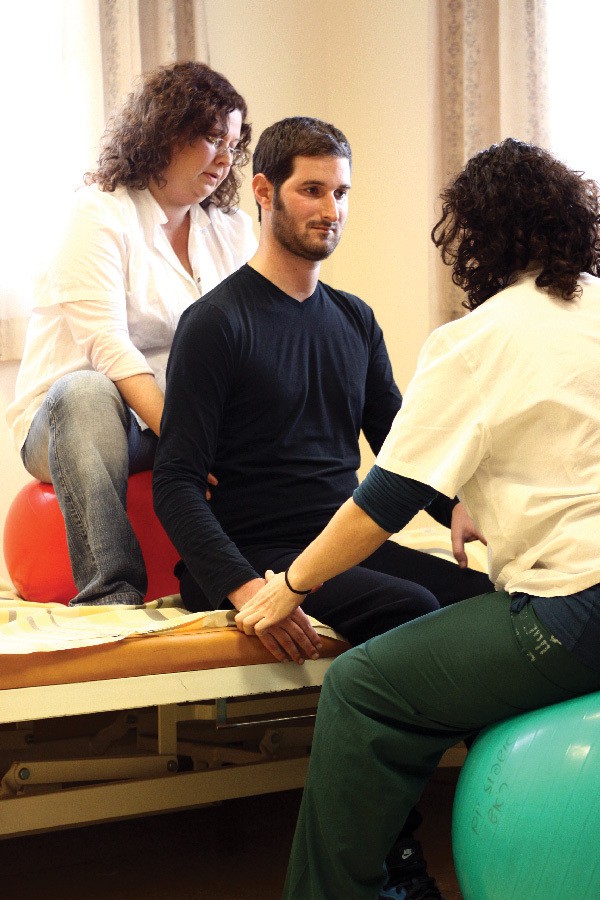“I vaguely remember falling back, everything went blank. A bullet had penetrated through my forehead.”
It is every Israeli parent’s worst nightmare — that unexpected, heart-stopping knock on the door. On August 8, 2006, Marcel and Itzik Kendelstein were sure they were going to be told that their son Dror, who was serving in Lebanon, was dead.
They were relieved to hear that Dror was alive — but barely. He had suffered a severe head injury. They braced themselves for what lay ahead.

Dror Kendelstein receives physio at a Beit Halochem Centre
When the Second Lebanon War broke out, Dror immediately responded to the call. This was not his first time serving in the army. He had previously been in many life-threatening situations, especially in Gaza. He was proud to protect Israel.
His platoon was positioned in the outskirts of Bint Jbeil, surrounded by enemies.
“We were supposed to clear the terrain for heavy Engineering Corps vehicles, the D-9 and the Pumas (armored personnel carriers). We lay low to secure the vehicles from enemy ambush. Many hours passed, and then I vaguely remember falling back. Everything went blank. A bullet had penetrated through my forehead.” Dror’s life suddenly changed forever.
For seven long months Dror was unconscious. When he was able to sit up strapped in a chair, his eyes were open but he was unresponsive and non-communicative.
Itzik talks of the pain of watching his son confined to a wheelchair, completely detached. “We’d talk to him, play music that he loved, put him in front of a television. But nothing — nothing.”
Finally, the doctors told his parents that his brain was in distress and that a drainage tube had to be inserted if he was ever going to wake up. It was a very risky procedure, but thankfully successful.
When Dror awoke he remembered what had happened. Unfortunately he also found out that his world was shattered. He was a quadriplegic who suffered epileptic seizures and had a speech impediment.
He was heartbroken and angry, but he was also determined. Dror had to start from zero. He had to re-learn everything, including how to talk and eat. This took many years of painful, intensive rehabilitation and he still has a long way to go. Dror is a courageous young man who is fighting to regain his life.
Thanks to your dedication and commitment to the wellbeing of Israel’s heroes like Dror, he is able to access the finest rehabilitative care at our Beit Halochem Centre. We will support him today and for the rest of his life.
Dror travels 45 minutes each way to the Beit Halochem Centre in Tel Aviv. His physiotherapy and occupational therapy are often agonizing, but Dror perseveres, never giving in to the pain. At Beit Halochem he also plays table tennis to sharpen his skills and receives computer training.
Dror passionately wants his independence, and at Beit Halochem we are determined to assist him in reaching his goal. Our broad array of therapies and services provide state-of-the-art treatment for disabled veterans like Dror.
Today there are over 58,000 Israeli disabled veterans and victims of terror who need your support.
We long for peace, yet the battle to defend and secure Israel never ends. Unfortunately, membership at Beit Halochem keeps increasing.
Beit Halochem Centres in Tel Aviv, Haifa, Nahariya, Jerusalem and Beer Sheva provide a home away from home for our wounded members, a place of respite, nurturing and healing. Here our veterans and their families find the support and companionship of others in similar situations. The strength they provide each other is life-changing.
Beit Halochem’s services also help them cope with the horrors of post traumatic stress syndrome which can be just as debilitating as their physical wounds.
Please keep Dror – and all Israel’s heroes like him – in your heart. Donate generously to Beit Halochem Canada, Aid to Disabled Veterans of Israel so we can ensure that these brave wounded veterans have the help they deserve in order to regain their lives.
